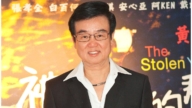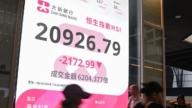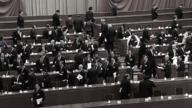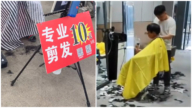【新唐人2011年6月17日讯】北京中央银行最近公布一份调研报告说,从上世纪90年代中期到2008年,中共党政、公安、司法干部、国营企事业高管、驻外中资机构外逃、失踪人员高达16000到18000人,携款金额达8千亿元人民币。不过,学者专家指出,中共官员外逃人数和携款金额,远不止官方公开披露的数目。
这份名为《我国腐败分子向境外转移资产的途径及监测方法研究》的报告,由央行反洗钱监测分析中心课题组2008年6月完成,日前获得中国金融学会第九届优秀金融论文及调研报告的一等奖。
6月14号,央行网站首次公布了这份报告,中外媒体和网站纷纷报导、转载。但随后,央行网站删除了这份报告和获奖公告,国内多个新闻网站的相关报导也都被删除。
这份报告指出,贪官转移资金的“重点关注地区”有:北美、澳大利亚、东南亚、以及与中国无引渡协议的小国等18个地区。而香港、澳门成为“主要中转地区”。
报告列举贪官向境外转移资产的8种方式:包括现金走私、替代性汇款、经常项目造假、海外投资、信用卡消费、离岸金融中心、海外直接收受、透过境外特殊关系人转移等。
报告列举中国银行广东开平支行三位原行长许超凡、余振东、许国俊,三人出逃美国携款高达4亿8千3百万美元,余振东在8年里,通过在香港开设公司来转移资金。
这份报告引起中国网民的热议,网民认为贪官外逃卷款远不止8千亿。人民网《强国论坛》的网友说:“0.4%的人聚集了70%的财富,如果这些人转移资产,13亿劳动者的血汗将付之东流。”。
北京理工大学经济学教授胡星斗说:在目前“国进民退”的形势下,国有企事业成为腐败和两极分化的根源。
胡星斗:“尽管我们也已经制定了反洗钱法等等,但是事实上资金外逃恐怕一年比一年更加严重。”
据《新华网》的报导,国家级贫困县江西鄱阳县,去年(2010年)全县财政收入只有4.1亿元。最基层干部、县财政局建设股股长李波华,一家四口逃往加拿大之前,留下了一封信,详细描述了他如何从国家专项账户中,套取近亿元资金的作案手法。
时政评论家曹长青说:中国财富向海外逃亡或转移,已经越来越形成了一个大潮。
曹长青:“今天无论是勤劳致富的人,还是贪腐的人,纷纷都把要钱转到美国去,最后一个大的共同点,就是对中国的制度、前景,没有确定性,所以感到不保险,恐惧将来会怎么样。”
胡星斗教授指出,中共政治体制是一个利益共同体,官官相护,“反腐败”之所以不见成效,因为“反腐败”已沦为排除异己、权力斗争的手段。正如民间流传的:“反腐败会亡党,不反腐败将亡国”。
美国哥伦比亚大学政治学博士李天笑,呼吁中共官员退出中国共产党:“据一般的报导来说,现在发现已经有120万左右的中共高官的家属已经出逃到国外,实际上中共中上层的人他已经意识到,预计共产党会崩溃,可能马上就要到来;所以在这种情况下,就迫不及待的寻找出路。最保险的就是要重新做人,退出中国共产党。”
《未来10年》(The Next Decade)的作者、美国战略预测专家乔治•弗里德曼最近表示,中国面临诸多的问题,其中之一是“两极分化”导致10亿以上人口像非洲一样贫困生活,社会不满情绪不断高涨,中共压迫国民加剧危机。他对中国的评价是崩溃,而不是崛起。
新唐人记者李元翰、肖颜综合报导。
=====
Missing RMB800 Billion
Beijing’s Central Bank recently released a report
spanning from mid-1990s to 2008, within the CCP
(Chinese Communist Party) and government,
public security bureau, judicial cadres, state-owned
enterprises, and overseas Chinese-funded institutions,
the number of missing persons is around
16,000-18,000, with a total of RMB800 billion
missing with them. Scholars point out that missing
officials and money are far more than this figures.
Monitoring Corruption: Assets Transferred’ was
reported by Central Bank’s Anti-Money Laundering
Monitor and Analysis Center in June 2008.
It won first prize in the 9th best financial
papers and research report contest.
On June 14, the Central Bank website published
the report, and soon Chinese and foreign media
reproduced it. Shortly after, Central Bank websites
deleted the report and award announcements.
All related reports were also deleted.
As per the report, funds were transferred to Australia,
North America, Southeast Asia, and small countries
without an extradition agreement with China.
Hong Kong and Macao were “major transit areas."
he report listed 8 ways of asset transfer,
including cash smuggling, alternative remittance, overseas
investment, account frauds, credit card expenses,
offshore financial centers, foreign direct receiving,
and transfers through “special people" overseas.
The report listed three former presidents of Kaiping
branch, Bank of China – Xu Chaofan, Yu Zhendong
and Xu Guojun. The three fled to the US
with $483 million. Yu Zhendong set up Hong Kong
companies to transfer funds over 8 years.
The report caused hot discussions amongst netizens,
who believed that cash flown overseas was far more
than RMB800 billion. On People’s Website,
one netizen commented: “0.4% of Chinese
gather 70% of the wealth, if they transfer assets,
Hu Xingdou, professor of economics
at Beijing Institute of Technology, said to VOA
that state-owned enterprises became sources
of corruption and polarization. “Although we have
developed an anti-money laundering law,
capital flow overseas is now more serious annually."
According to Xinhua reports, Poyang County,
a state-level poor county in Jiangxi, had revenues
of only RMB0.41 billion in 2010. A grass-roots
cadre, the Chief of Construction in the county’s
Finance Bureau, Li Bohua, left a letter before fleeing
to Canada with his family. The letter gave a detailed
description on how he took almost RMB100 million
from a special national account.
Current affairs critic Cao Changqing believes
that Chinese wealth flow or transfer overseas,
has formed a tide. VOA reported, “Today both
hard-working rich people and corrupt officers want
to transfer their money to the US. The biggest
concern is that China’s system and future
is uncertain. They fear to know the future."
Professor Hu Xingdou pointed out CCP’s political
system is a community of interests. “Anti-corruption"
has been ineffective, and has become a method
to eliminate dissidents and to stir conflicts.
As a popular saying goes: “Anti-corruption will kill
the CCP, but corruption will kill the country."
Li Tianxiao, Ph.D. in Political Science
at Columbia University, New York, called
upon Chinese officials to quit the CCP.
He told Radio Sound of Hope: “According
to general reports about 1.2 million families
of high-ranking officials have fled overseas.
Top CCP cadres have realized that the CCP will die
soon, and they’re looking for a way out eagerly.
The best way is to quit CCP and protect themselves."
Author of “The Next Decade", George Friedman,
also a US strategic forecaster, said China faces many
problems. Polarization leads to more than
1 billion people living in poverty like Africa.
Social discontent is growing, and CCP’s oppression
is increasing the national crisis. Friedman believes
there will be a collapse of China, rather than a rise.
NTD reporters Li Yuanhan and Xiao Yan.






























